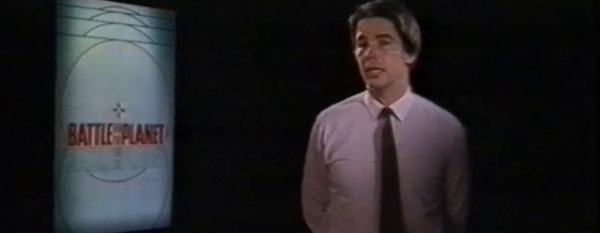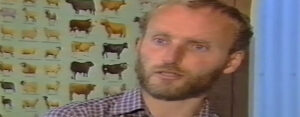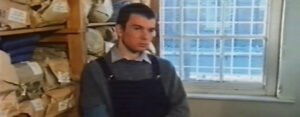Description
Battle for the Planet. Ep 1: A Struggle for Shelter. 30 minutesJonathan Porritt, at the time ( 1973) Director of Friends of the Earth introduces this episode based on the struggle in Ecuador by poverty stricken people, mainly peasants to get a decent roof over their heads. As peasants leave their villages and migrate to the cities, mainly the capital Quito in search of work so the housing shortage becomes more acute. Hundreds of thousands settle illegally and build ramshackle duelling on hillsides. A group manage to form a co-operative and buy a hillside and construct small simple houses but still face the problems of no electricity and water. Also is five hours out of the day to get to and from work in the centre of the city.Battle for the Planet. Ep 2: Eight Litres a Minute – Air Pollution. 30 minsJonathan Porritt, at the time ( 1973) Director of Friends of the Earth introduces this episode on how the ecological cycles is being broken and the need to combat acidification which is destroying trees ( This was at a time when the menace of large scale logging of the rain forests had not got going). Sweden was attempting to combat it but in Mexico it was difficult to combat the multinational companies who can do there what they are not allowed to do in their home countries. Issues covered are ; Vehicle exhausts, Industrial pollutants from firms such as Union Carbide ( responsible for the Bhopal disaster in India), Birth defects, People organising to better their own lives.Battle for the Planet. Ep 3: The Kingdom of the Third day 32 mins.Jonathan Porritt, at the time ( 1973) Director of Friends of the Earth introduces this episode on the dumping of toxic waste in the sea. Polluted beaches. Sewage outflows. Nuclear radioactive waste. A Greenpeace survey of Swansea Bay shows the buildup of heavy metals and PCB leading to the poisoning of fish in coastal waters. Greenpeace also trying to prevent the dumping of nuclear waste in barrels which will soon corrode and release their contents.Battle for the Planet. Ep 4: Shifting Sands 32 minsJonathan Porritt, at the time ( 1973) Director of Friends of the Earth introduces this episode in which a farmer from Nebraska USA visits Inner Mongolia to see how grassland, through over population by sheep, became desert. He also sees efforts to reverse this trend. The water table is near the surface and so attempts at re-cultivation take place. A good anthropological picture of a life style.Battle for the Planet Ep 5: Greening the Land 32 minsJonathan Porritt, at the time ( 1973) Director of Friends of the Earth introduces this episode about attempts in Sudan and Northern India to reverse the land degradation. Long ago before central government interfered trees were considered the communal property lot the local village and managed in a traditional manner. But when government took ownership, the taboos of cutting down healthy trees went. As the trees went the desert took over. Large scale government projects imposed on the villages without consultation failed. Now (in 1973) plant nursery and wells are being established. The women, who are Muslim are very much involved in this work.But the new plantations have to be fenced so as to protect them from animals.In Northern India in the foothills of the Himalayas, the Chipklo Movement is defending the trees against deforestation carried out by large scale logging companies which cause landslides. World Bank projects are condemned as they do not involve local communities and eventually fail. Battle for the Planet Ep 6: People Count 32 minsJonathan Porritt, at the time ( 1973) Director of Friends of the Earth introduces this episode which deals with population growth. Kenya is a country where there is large population growth. In 1973 half the population is below the age of 15. The probing is that traditionally large families = Insurance. Annual population growth is 3% while food production growth only 1%. Moreover more and more land is used to grow crops for export. Thus food shortages pushes up prices. More attention is being given to Family Planning Clinics but these do not reach out to the villages. This causes migration to the cities in search of work. Nairobi centre seems a prosperous place but on the outskirts shanty towns are mushrooming. It is hard work on the family farms, Finding water is often a problem.Battle for the Planet Ep 7: A Safety Net? 28 minsJonathan Porritt, at the time ( 1973) Director of Friends of the Earth introduces this episode which poses controversial questions about food aid.An African professor of Food matters questions the value of food aid except in emergency situations. and gives many example where food aid has destroyed the economics of growing food to feed the local populations. Also the growing of cash crops for export where prices can greatly change from one year to another causes food prices locally to rise. Because of a lack of processing machinery there is a lot of wastage. Far better if donor countries supplied technology instead of food. One example of a food research lab in Senegal is shown.
This programme can be rented on our Video on Demand system for £2.00, for this you can view as often as you like within a 48 hour period of your own choosing, the film is available to stream or download for £10.00.
Interested in a USB instead of a DVD for £24.50, email us directly sales@concordmedia.org.uk or follow this link: https://www.concordmedia.org.uk/contact-contact/
Battle for the Planet from Concord Media on Vimeo.





Reviews
There are no reviews yet.